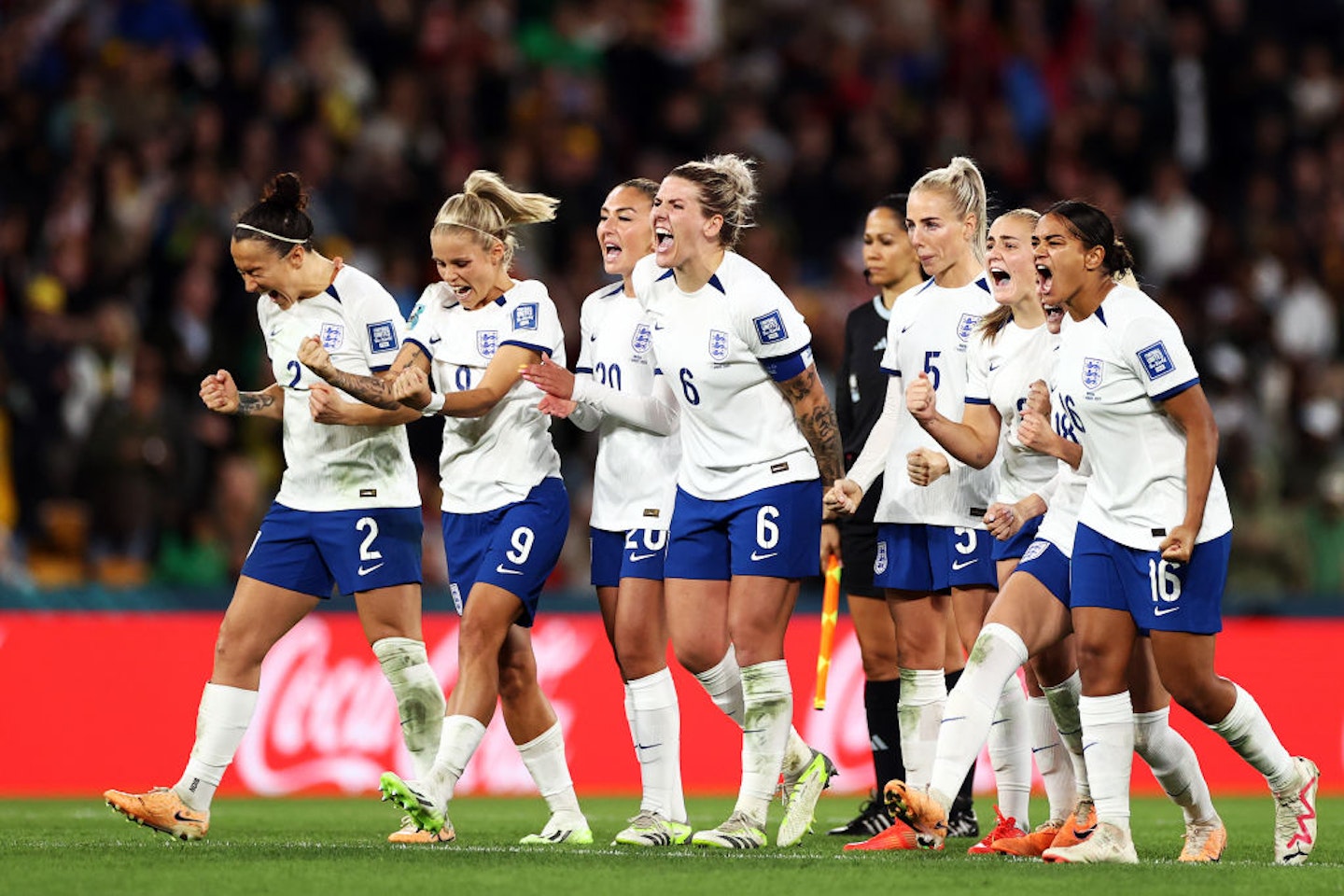The 2023 Women’s World Cup was a momentous tournament. Every team that competed from the quarter-final stages onward made history for their country; England in particular made it to a World Cup final for the first time in 53 years. There was a record attendance of almost two million across the matches in Australia and New Zealand, and record-breaking viewing figures on television in the UK and around the world.
And yet despite this absolute shattering of the glass ceiling for women in sport, the events that followed Spain’s win have cast a dark shadow over the tournament. Luis Rubiales is currently facing calls to resign as president of the Spanish Football Federation – by regional leaders in the organisation – after he kissed Spanish player Jenni Hermoso on the lips during the medal ceremony for Spain’s World Cup win.
Spanish prosecutors have opened a preliminary investigation into whether the incident amounts to a crime of sexual assault, after Hermoso said that the kiss – which was caught on camera and watched by millions of viewers - was not consensual. Rubiales, who is also a vice president at UEFA (the governing body for football in Europe) was suspended by FIFA (the governing body for football globally), after the 46-year-old insisted he would not resign and alleged the kiss was ‘mutual and consensual’. On Monday, Rubiales' mother Angeles Bejar locked herself in a Spanish church and went on a hunger strike, in protest of the treatment of her son.
In a statement made after the incident, Hermoso said the following: 'I feel the need to denounce what happened because I believe that no person, in any work, sports or social environment, should be a victim of this type of non-consensual behaviour. I felt vulnerable and the victim of an aggression, an impulsive, machista [chauvinistic] act, out of place and without any consent on my part. Simply put, I was not respected. I want to reiterate that I do not have to support the person who has committed this action against my will, without respecting me, in a historic moment for me and for women’s sport in this country.'
Now, fans and players everywhere are speaking out to support Jenni Hermoso, particularly after she was threatened with a lawsuit by the Spanish football federation ‘for lying and defamation’. The Lionesses posted a group statement on Instagram, saying ‘Unacceptable actions allowed to happen by a sexist and patriarchal organisation. Abuse is abuse and we have all seen the truth. The behaviour of those who think they are invincible must not be tolerated and people shouldn’t need convincing to take action against any form of harassment. We all stand with you, Jenni Hermoso, and all players of the Spanish team.’
When I catch up with Jess Carter, England’s key defender in their World Cup campaign, I can feel the weight of such a demoralizing incident overshadowing what was otherwise a career-defining success for the women involved.
‘It’s really sad and disappointing to know that Spain have just achieved one of the most incredible things that they're ever going to achieve, and it's just been pushed aside for this ridiculous moment,’ Carter tells Grazia. ‘I feel sad for Jenni, she knows we all support her – everyone around the world is supporting her right now.’
I feel sad for Jenni, she knows we all support her - everyone around the world is supporting her right now.
JESS CARTER
‘UEFA and FIFA have got to do more to support [women] and get to the root of what the problems are, not just the ridiculous actions of the Spanish [Federation] president but whatever is going on within the Federation,’ Carter continues. ‘You can't be on a world stage and be acting like that, if you’re willing to do that on a world stage, what are you willing to be like behind closed doors? That's how I feel about things personally. Hopefully all the issues can be resolved quickly, so that the Spanish team can continue to just focus on celebrating and being absolute icons for their country.’
What is inspiring though, is the comradery that has come together in support of Hermoso. As well as the Lionesses speaking out, male Spanish teams competing over the weekend took the opportunity to protest Rubiales actions. Sevilla’s players wore shirts emblazoned with the phrase 'It's over' ahead of their LaLiga defeat to Girona on Saturday, while Cadiz players laid out a banner on the pitch ahead of their game against Alemria on Saturday that read ‘We are all Jenni.’ All 23 players of Spain's Women’s World Cup-winning squad have also said they will not play for their country again as long as Spanish Football Federation (RFEF) president Luis Rubiales remains in charge.
‘It’s already shown the power of the togetherness in women's football from players to fans all across the world,’ Carter says. ‘It’s devastating that it's a moment like this that's had to bring people together, but it shows that we have power, all of us have power in our voices, and what Hermoso is doing - standing up and fighting - is really admirable because she was put in such a difficult position going against someone with such power. That can be really difficult thing to do, so it takes a lot to stand up and fight that, so it’s a massive credit to her, she’s inspiring a lot of people by doing so.’
Frankly, Hermoso’s strength and that of the countless athletes standing behind her, makes a much bigger statement about how far the women’s game has come in recent years, and the way in which that has empowered female players to speak out against injustice.
I have reported on women’s football for years now, and interviewed countless players in the process, and it was only four years ago that hearing a player speak out about inequality in the sport would be extremely rare. Thanks to severe damage done by the ban on English women’s football in particular by the Football Association (FA), that was only lifted in 1971, England did not have a fully professional women’s football league until 2018. There was a fragility to the sport then, and you could feel that in the hesitancy of players (at least, those who weren’t retired) to make a stand about the way in which female football players are treated around the world.
Now, that all appears to have changed – and it’s no doubt in part due to the legacy-creating World Cup tournament that England mastered. Carter in particular was indispensable in that, her no-nonsense approach to the game making her a regular feature in manager Sarina Wiegman’s starting 11. That hard-working ethos is evident even when I ask her about how it felt to become the first World Cup squad to make a final since 1966.
‘When I was in the tournament, I don’t think I’d even realised what we’d achieved because you’re just so focused on the next game and time moves so fast,’ Carter laughs. ‘You don’t really have time to live in the moment, so I was very much like “Onto the next, let’s get the job done.” But afterwards now, I can see what we've done is incredible. Seeing everyone's support on social media and back here. Now it feels pretty special to have achieved that.’

You can gauge even more about Carter's on-pitch psyche after finding out her favourite game was the quarter-final against Colombia, because the crowd were ‘unbelievably against England.’ Where one might find thousands of people screaming for their demise intimidating, it spurred the England team on to dig deeper.
‘Colombia’s fans were outrageous, and [the team] were so good,’ she says. ‘We went a goal down and we just had to find something, some grit or determination, to try and come back against a really tough team. For me, that was where the business started, and it was a really exciting game to be part of.’
Off the pitch though, it was a pre-tournament beach night with her team that stood out as her favourite moment. ‘We were staying in the Sunshine Coast at this lovely resort where the beach was a five-minute walk away,’ she recalls. ‘And it was actually just a coincidence but after dinner all of the team just ended up walking to this beach and we all just sat there as it was getting dark, and we just chilled together. It was just a really nice moment with the team.’
It was amazing to see how excited everyone was, and the number of fans that were in Australia for the tournament.
JESS CARTER
It's hard to imagine what one might expect of a World Cup tournament, but what did surprise Carter was the level of fandom the women had over in Australia. ‘I’d never been to Australia or seen what the football and the fanbase is like there,’ she says. ‘It was amazing to see how excited everyone was, and the number of fans that were there. It sounds ridiculous because we were there for the Women’s World Cup, but we would go to a coffee shop and people were wanting photos with us and I’d be like “We’re not even in our England kit, how do you know who we are?” That was my naivety, but sometimes I forget how big women’s football has got.’
Did she feel the pressure then, particularly going into the final? ‘For me, I approach every game the same way, you want to win everyone,’ she says. ‘When there’s more at stake, it does give you a bit more motivation and incentive to push harder, but I don’t really get nervous or feel the pressure that much.’
It was only then when the final whistle blew that it registered to Carter it was all over. ‘I was gutted because I know we didn’t play as best as we could,’ she says. ‘Spain is a phenomenal team, but we got a couple of things wrongs. I felt like we were really piling the pressure on them in the second half and genuinely believed we were going to get a goal until that final whistle went. To be honest, the disappointment went quite quickly because I am a realist and, in my opinion, we didn’t deserve to win that game. I was so proud to be in a World Cup final and to have achieved that, so the sadness quickly went.’
Now then, she hopes that the impact of their achievement will continue to make waves across the women’s game. ‘I think we’ve all been trying to push the women’s game in a really positive direction, whether that be the quality of the football or the facilities, injury prevention, whatever it is,’ Carter explains. ‘I’d like to think that with us doing better, and women’s football in general getting so much bigger, that more people are wanting to support and push the game further. We’ve got a really good group of girls at England, people that are really strong-minded in figuring out how we can improve this, so it can only get better.’
Hero image picture credit: Serena Brown
